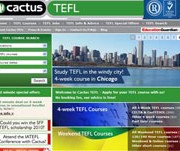There is little more disheartening than deciding on a specific short-term project or long-term change, only to find that there is no concrete information available to you on how you can make it happen.
I imagine that this is often the case with people whose projects and life changes centre around teaching English as a Foreign Language (TEFL).
There are so many different courses available, and so much conflicting information on which are best and which will get you where you want to be, that it’s extremely difficult to know which one you should choose.
Included amongst the myriad of options, are four-week TEFL courses, weekend TEFL courses, online TEFL courses, combinations of online and weekend TEFL courses..the list goes on and on.
As is the general rule in life, the bigger the investment you can make, the bigger the reward will be. Anyone who is able to invest the time and money in doing a month-long (or part-time equivalent) course that will lead to either a Cambridge CELTA or Trinity Cert TESOL qualification is certain to have the most flexibility when it comes to where they can work and in what capacity. These qualifications have traditionally been the most widely recognised qualifications internationally, and are the only to feature within the UK national framework of qualifications (at level 4).
Anyone who is thinking of making a career in TEFL, of teaching in a range of different countries, or of teaching in the UK at any point would be advised to try to get one of these two qualifications if at all possible.
There are plenty of other, good-quality, four-week courses around that would provide you with a TEFL certificate too, but as a result of being moderated and examined in-house, they would not give you a Cambridge ESOL or Trinity College ‘stamp of approval‘. In many places, these would count as equal to the CELTA/Trinity qualifications, but amongst the more prestigious and traditional establishments you may still need to be prepared to justify your choice of course.
For those that cannot afford the time or expense of doing one of these month-long courses, the good news is that despite the general overriding preference for Cambridge CELTA/Trinity Cert TESOL or equivalent-length courses, the huge demand for teachers worldwide, and the lack of any real overseeing authority to dictate specific rules and regulations within the TEFL industry worldwide means that all is not lost. There are plenty of other options that will get you work.
Although online learning in the TEFL sense has its drawbacks in that no actual teaching practice is possible, there are definite advantages to doing your training this way. If you can couple this type of course with a weekend or short course to allow you some experience of standing up in a classroom, even better.
A lot of people who choose to take online, or weekend-type courses tend to be looking for a way to ‘dip their toe’ into TEFL waters, and for this purpose they are great. Starting off with a shorter and more flexible course to give you some basic knowledge will also give anyone hoping to do a more comprehensive course such as the CELTA/trinity Cert TESOL a definite head-start, and can be great for helping to achieve a really good grade on your final qualification.
Another category of people to be suited to courses like these, involves those whose TEFL plans are very short-term, and possibly even secondary to another project such as travelling or volunteering abroad for a few months. Weekend TEFL certificates and the like can be a great tool to carry abroad with you, just in case you need to top up funds along the way.
Although some TEFL courses are obviously more comprehensive than others, all will provide you with a variety of skills that will be useful not only within the TEFL sphere but in a more general context too. As long as you have the time, the money and the inclination, it’s also worth remembering that you can start with the basics and work your way up. The great thing about the range of courses out there means that you don’t have to take the leap and invest your savings in a comprehensive course until you know that it’s definitely for you.



